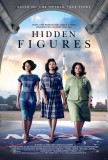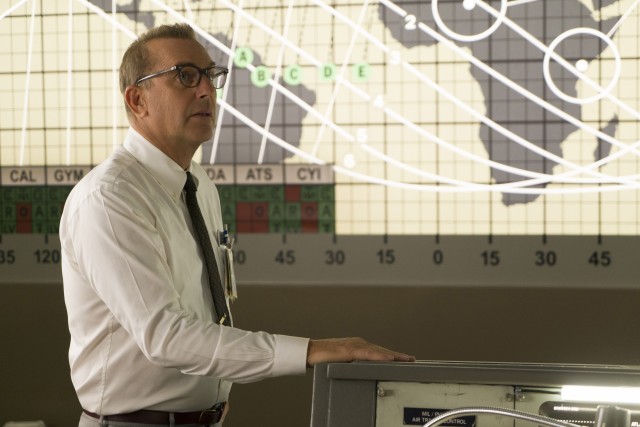Hidden Figures Movie Review
 |
Hidden Figures
Theatrical Release: December 25, 2016 / Running Time: 127Minutes / Rating: PG Director: Theodore Melfi / Writers: Alison Schreoder, Theodore Melfi (screenplay); Margot Lee Shetterly (book) Cast: Taraji P. Henson (Katherine G. Johnson), Octavia Spencer (Dorothy Vaughan), Janelle Monáe (Mary Jackson), Kevin Costner (Al Harrison), Mahershala Ali (Jim Johnson), Jim Parsons (Paul Stafford), Kimberly Quinn (Ruth), Kirsten Dunst (Vivian Mitchell), Glen Powell (John Glenn), Aldis Hodge (Levi Jackson) |
Writer-director Theodore Melfi follows up his feature debut, 2014's sometimes funny and sometimes heartbreaking African-American friends Katherine Johnson (Taraji P. Henson), Dorothy Vaughan (Octavia Spencer), and Mary Jackson (Janelle Monáe) all work at NASA's Langley Research Center in Virginia. Racism remains prevalent in the South and the women get tense when a cop finds them pulled over on the side of the road due to car troubles on their carpool commute. NASA has opportunities for women and even black women, but they are somewhat limited. Segregation is still a thing, so separate bathrooms and drinking fountains are found around the campus.
The film divides its time fairly evenly among the three women. Katherine gets assigned to work directly under Space Task Group director Al Harrison (Kevin Costner), where she gets to check the calculations of partially redacted rocket launch documents. Already functioning as a supervisor among other black clerks, Dorothy pushes for that title to some resistance (from Kirsten Dunst) and also comes to get acquainted with the big card-using IBM computer NASA has just had delivered. Mary longs for an engineering job, but is told she needs additional education credits, which she only get at a school that won't allow African-American students.
Though it occupies the wider aspect ratio and sports fine production values, Hidden Figures still feels more like television than cinema. Melfi, who co-wrote the screenplay with Allison Schroeder (Mean Girls 2) from Margot Lee Shetterly's just-published book of the same name, is inexperienced enough to not have a clear style with which to inject the proceedings. But the movie suffers as a result of that, always remaining watchable and agreeable but never having the dramatic or emotional impact you want it to. It is serviceable filmmaking, but this time of year demands more than that and when viewed alongside its fellow contenders, Hidden Figures does not feel all that special.
The obstacles these women face, like Katherine having to walk a half-mile to use the nearest colored women bathroom, evoke empathy. And their willingness to persevere in the face of such systematic oppression, So few movies are made with women in the foreground. Even fewer movies are made with people of color in the foreground. Knowing that, it's tough to get too bothered that Hidden Figures is merely good, not great. It's inspiring, educational, kid-friendly, polished, and tasteful. So what if none of the three actresses hits it out of the park or even manages to keep the historically bland Kevin Costner from arguably giving the film's most personable performance? Although the subject matter, Christmas Day opening, and studio campaign all paint this as a serious awards contender, it's probably more just a holiday season crowdpleaser, assuming audiences can find it among the flashier releases it's up against.
|
Related Reviews:
DVDizzy.com | DVD and Blu-ray Reviews | New and Upcoming DVD & Blu-ray Schedule | Upcoming Cover Art | Search This Site
DVDizzy.com Top Stories:
Now in Theaters: Loving • Moonlight • La La Land • Manchester by the Sea • Nocturnal Animals
Written and Directed by Theodore Melfi: St. Vincent | Written by Allison Schroeder: Mean Girls 2
Taraji P. Henson: No Good Deed • The Curious Case of Benjamin Button • Think Like a Man • Think Like a Man Too • Karate Kid
Octavia Spencer: The Help • Fruitvale Station • Paradise • Snowpiercer | Janelle Monáe: For Colored Girls
Kevin Costner: Criminal • Draft Day • Swing Vote • The Guardian • The Company Men
Selma • Glory Road • The Sapphires • Remember the Titans
Text copyright 2016 DVDizzy.com. Images copyright 2016 20th Century Fox Pictures, Chernin Entertainment, and Levantine Films.
Unauthorized reproduction prohibited.

